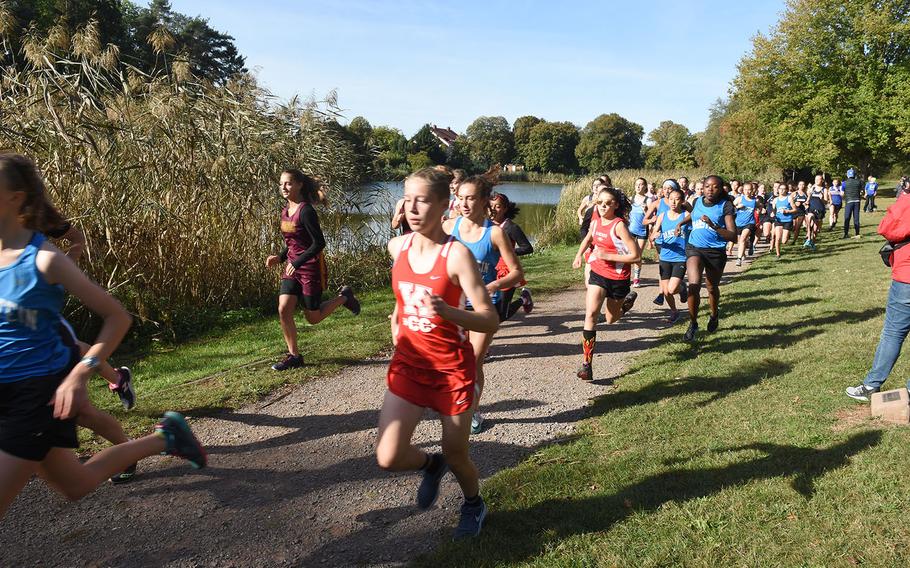
Kaiserslautern's Chloe Martin races towards the front of the pack at the start of the Ramstein cross country meet on Saturday, Sept. 29, 2018, in Miesenbach, Germany. (Jennifer H. Svan/Stars and Stripes)
At its simplest, a successful cross country running season involves putting one foot in front of the other. But it also requires a degree of balance. DODEA-Europe teams have reached that point in the fall where balance truly comes into play. This Saturday holds the last meets of the regular season; a week later, the organization’s top runners will compete for the European championship. Success at that latter meet is the ultimate goal; the race before it can present as many problems as opportunities. “I think I can speak for all coaches in that we want runners well-rested going into the championship,” Stuttgart head coach Philip Bailey said. “But we want the muscles firing properly for peak performance.” That gets to the paradoxical heart of the season’s penultimate meet. A runner pushing hard this weekend for a new personal record might fall victim to overexertion, exhaustion or injury, or perhaps simply fall short and suffer an ill-timed confidence dip. A runner who eases up this weekend might lose access to the competitive edge they’ll need just seven days later. “The athletes’ bodies should be at about their breaking point for the championship if we train properly,” Bailey said. Identifying that point is, so to speak, the point, and there can be as many different personal thresholds as runners on the roster. “The difficulty as a coach is taking into consideration the ages and abilities of our runners,” Bailey said. Brussels coach Dirk Vander Hulst said that a subdued approach leading up to the championship race doesn’t necessarily mean increased endurance or performance at the main event. “Resting athletes for the sake of resting can be tricky,” Vander Hulst said. That’s the balancing act facing DODEA-Europe cross country teams this weekend. Vander Hulst said there are “usually two different groups of runners at the end of the season.” The first includes the more accomplished athletes with a greater feel for their own potential and limits. Those athletes are “trying to peak at the right time;” namely, a week later at the European finals “For them it’s more of a concern because most of the work is done and we are just trying to fix little stuff and have good workouts that are fast and productive,” Vander Hulst said. The second group, Vander Hulst said, includes less seasoned runners still finding their way in the sport. For them, especially on a smaller team like Brussels, the end of the season offers the chance to improve one’s standing on the squad and enter the offseason on an upward trend. “I find it to be a very motivating time during the season,” Vander Hulst said. Ramstein volunteer coach Mick Thomsen said the Royals ask their runners to “learn about how they feel and act when at their limits and to push harder to improve.” In the process, he wants all of his runners finishing as strong as those limits will allow. “Winning becomes a habit, so we will always push and challenge to be first,” Thomsen said. “I want them all to perform how they would at every race. Give it their all and race hard.” Ultimately, the final Saturday race of the regular season is a fleeting moment quickly overwritten by the final week of practice and the season-defining European championship, set for Oct. 27 at Baumholder, Germany. But if it’s handled correctly, this week can lead to lasting glory. “A great race the weekend before can be the trigger that motivates the athletes to run their best ever at the championships,” Bailey said. broome.gregory@stripes.com Twitter: @broomestripes